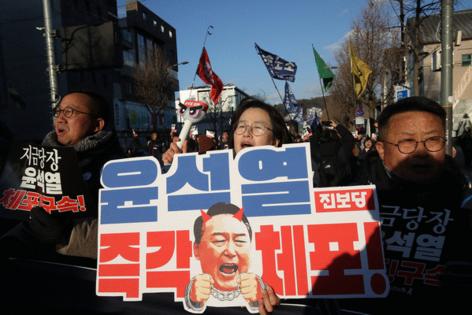South Korea investigators fail to arrest President in standoff
Published in News & Features
South Korean anti-corruption investigators failed to arrest impeached President Yoon Suk Yeol after a nearly six-hour standoff with his security team on Friday, showing tensions remain high even after he was impeached and suspended.
On a frigid day in Seoul, a team from the Corruption Investigation Office for High-ranking Officials backed by some 2,700 police officers surrounded Yoon’s residence in Seoul’s Yongsan district. His security team blocked investigators from executing the arrest warrant for insurrection related to Yoon’s brief imposition of martial law a month ago.
With about a thousand Yoon protesters gathered outside his residence, the investigators called off their efforts at 1:30 p.m. local time due to safety concerns for personnel on site. Yoon’s representative called the arrest attempt illegal and vowed to take legal action. He had previously sought an injunction from the Constitutional Court, which is separately hearing his impeachment trial, to block the warrant.
“Execution of the arrest warrant was virtually impossible due to the continued standoff,” the Corruption Investigation Office said in a statement on Friday. “Future measures will be decided after a review. We express our deepest regret over the suspect’s refusal to comply with legal procedures.”
The attempt to arrest Yoon came after he refused multiple requests to appear for questioning over his actions on Dec. 3, when he declared martial law for roughly six hours in an episode that shocked the nation and the world. While the Constitutional Court is proceeding with hearings on whether to confirm his impeachment and kick him out of office, a process expected to take weeks or months, investigators are concurrently investigating criminal charges for insurrection.
The investigation office will review the situation and decide whether to try arresting Yoon again, YTN reported, citing a briefing by the agency on Friday afternoon. The court-issued warrant will expire by the end of Monday, after which investigators can decide if they want to apply for a new one.
Police had earlier deployed about 2,700 officers near Yoon’s residence, according to Yonhap News, as his supporters gathered to block the country’s first-ever attempt to arrest a sitting president. Police estimates put the number of demonstrators at around 1,200, Yonhap said.
Protesters were chanting “Disband CIO” in reference to the investigating agency. Some were shouting “Arrest Lee Jae-myung,” the opposition leader seen as a top contender to take power if Yoon is removed from office.
Yoon’s lawyer said in a statement that the CIO doesn’t have the authority to investigate insurrection and that it’s trying to “forcefully execute” arrest and search warrants by mobilizing police troops. The lawyer accused investigators of trespassing and attempting an unlawful arrest and detention.
The opposition Democratic Party has pushed for the insurrection probe into Yoon. Park Chan-dae, the party’s floor leader, told reporters that he’s urging the CIO to attempt Yoon’s arrest again immediately. He said in a video that anyone obstructing law enforcement should be arrested on the spot for hindering their duties.
South Korea has been in a political crisis since Yoon’s martial law declaration, which he swiftly repealed after lawmakers raced to parliament and voted to overturn the measure. The move rattled financial markets, hurt the local currency and disrupted diplomatic efforts. It’s also weighed on the economy, prompting the government to cut its 2025 growth forecast to 1.8% from 2.2%.
The Kospi stock index on Friday pared gains to 1.7% after the failed arrest, following five consecutive sessions of declines. The won rose 0.3% against the dollar.
After Yoon was suspended from his duties on Dec. 14, Prime Minister Han Duck-soo, who briefly stepped in as acting president, was impeached as well. Finance Minister Choi Sang-mok is now the interim leader.
The impact of the martial law and the president’s impeachment are “already fully priced in,” Jung In Yun, chief executive officer of Fibonacci Asset Management Global, said in a Bloomberg TV interview. Korean stocks, he said, are “very cheap right now.”
Yoon has signaled his intent to fight in court to stay in office, saying his martial law decree was within his constitutional powers. He’s facing a trial that will decide whether he will be reinstated or permanently removed from office.
The Constitutional Court, which has until June to make a ruling, said the impeachment trial will officially start on Jan. 14. Choi has appointed two new judges, increasing the likelihood of a decision to finalize Yoon’s removal.
Lawmaker Jung Chung-rai of the Democratic Party, who is representing parliament at the impeachment trial, said Yoon’s resistance to abide by the law shows his insurrection attempt is still ongoing.
“We’re experiencing once again today that arresting and detaining insurrection suspect Yoon Suk Yeol and removing him from office through a swift trial at the Constitutional Court is absolutely necessary to stabilize the country,” Chung told reporters as he arrived at the Constitutional Court in Seoul.
As the political turmoil deepens, the country is dealing with the aftermath of a Jeju Air flight crash over the weekend, which killed all but two of the 181 people onboard. Choi has declared a week-long mourning period until Jan. 4.
—With assistance from Shinhye Kang, Adrian Leung, Shadab Nazmi, Youkyung Lee, Abhishek Vishnoi and Jaehyun Eom.
©2025 Bloomberg L.P. Visit bloomberg.com. Distributed by Tribune Content Agency, LLC.







Comments